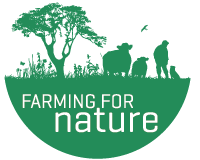Mark Gillanders
Mark Gillanders runs a mixed organic farm in County Monaghan. About 75 acres of cereals are grown on the farm and the remainder of the land is permanent pasture and clover/multispecies pasture. Mark runs a suckler herd of about 20 cattle and the stock are very extensively managed. Red clover silage produces winter feeding for the cattle who are indoors for just a few weeks over the winter months. Organic oats are grown and supplied to Flahavans. Organic wheat is grown on the farm and is locally milled into strong Irish flour and sold in the Irish consumer market. Mark has incorporated rotational combi crops into the farming system, mainly wheat and beans growing together, which are separated leaving the wheat for flour and the beans for animal protein, thus reducing the amount of imported protein. There is about 5 acres of uncultivated wetland on the farm which is left for biodiversity and wildlife. Thick hedgerows are managed for biodiversity and along with pockets of woodland they make up nature corridors running throughout the farm. Since converting to organic in 2009, Mark has observed a significant increase biodiversity on the land – "The farm has improved tremendously in terms of biodiversity on the land, as well as climate and economic resilience." Mark achieved a Master of Science in Organic Farming from Scotland’s Rural College in 2019. He is proud to run a farm that produces high quality food for human consumption as well as providing for local wildlife and biodiversity.
Nomination:
Farming 142 acres, 95 of which are leased. Cereals and suckler beef. Farming organically since 2009. Achieved a Master of Science (Organic Farming) at Scotland’s Rural College, awarded by the University of Glasgow in 2019. Since converting to organic farming, Mark has gained a lot more knowledge of how to produce food in harmony with nature, bringing his farm on a journey to where he is now producing more food for human consumption, entirely regeneratively, than he previously did conventionally. Monaghan land once grew lots of cereals but over the last 50 years has grown very little because of conventional viability. He went against this trend, reintroducing a number of cereals to the farm, including wheat and oats. This has been a learning curve but I am delighted with the results. The rotation system he uses has brought a large amount of small birds and creatures back to the farm and general area. The increased biodiversity has been noticed by neighbours and farmers alike. Crops grown consist of: ● Wheat for milling into organic flour for the Irish consumer market, which is going very well, including the production of high protein flour capable of making organic sourdough bread. ● Oats for Flahavan's organic porridge. ● Rotational combi crops – mainly wheat and beans growing together, which are separated leaving the wheat for flour and the beans for animal protein, thus reducing the amount of imported protein. Combi crops are very beneficial for soil structure and soil biological activity, as well as increasing the quality of both without any pesticides. ● Multi species pasture and red clover leys are used to very effectively rebuild fertility, increasing the organic matter in the soil which I describe as the battery to regeneratively produce food. ● Red clover leys are productive flowering high quality leys utilised for winter forage, although the need for winter forage is reduced by way of the natural green covers on the arable land during the late autumn and early spring, as no winter cropping is practised on this farm – all crops are spring sown leaving arable land much more stable and nutrient retentive. The suckler herd on the farm grazes the multi species pasture, which has very good productivity and anthelmintic properties virtually eliminating the need for anthelmintics, which are detrimental to soil biology. There is a good amount of space for wildlife, with areas of trees and untouched wetlands. The various plants and animals within the farm are making a huge difference to farm viability in tandem with natural cycles. It is all about working with nature, not against it. And the results in terms of productivity and increased biodiversity show that this is working.
Nominator: Suzanna Crampton, FFN Ambassador


